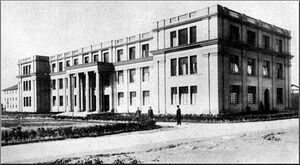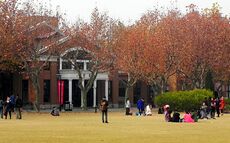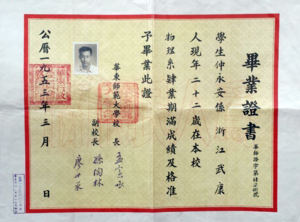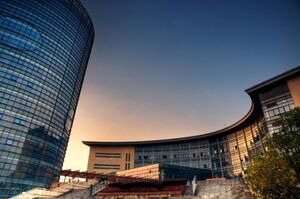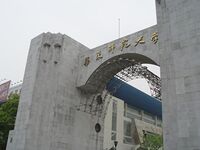East China Normal University
(University) | |
|---|---|
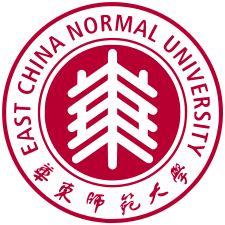 | |
| Motto | 求实创造,为人师表 |
| Formation | 1951 |
| Headquarters | Shanghai, China |
| Type | Public (National) |
| An elite research-intensive university | |
East China Normal University (ECNU) is a comprehensive public research university in Shanghai. It was formed in 1951 by the merger of the Great China University founded in 1924 and Kwang Hua University (est. 1925) which had its ultimate origins in the St. John's College established in the city in 1879. Its original role was to train teachers for secondary and higher education, as suggested in the name "Normal", but very soon housed top-class researchers and evolved into an elite research-intensive university.[1]
ECNU is now organized into more than 22 schools, colleges, and institutes, located in two campuses throughout Minhang and Putuo. The university comprises 2 affiliated schools across the Shanghai metropolitan area: NYU Shanghai in Pudong,[2] Asia-Europe Business School in Zizhu International Education Park. ECNU also maintains a National Forest Ecosystem Observation and Research Station in Tiantong National Forest Park, Ningbo, Zhejiang.
ECNU is a Chinese Ministry of Education Class A Double First Class University.[3] It is often considered to be one of the most prestigious universities in China and is internationally recognized, as evidenced by its partnerships with institutions around the world. Sponsored by the national program "Project 211" and "Project 985",[4] the university is a frontrunner in the nation's research and innovation,[5][6][7] and has been dubbed as the "Columbia of the East".[8] The university also has strong ties with the China Meteorological Administration, State Oceanic Administration and the Chinese Academy of Sciences.[9]
Contents
History
Origins
East China Normal University traces its roots to the formation of the St. John's College (later to become St. John's University) in 1879, and its heritage has had a deep influence in the development of Chinese modern higher education.[10]
In 1879, St. John's College was founded by William Jones Boone and Joseph Schereschewsky, Bishop of Shanghai, by combining two pre-existing Anglican colleges in Shanghai. In 1905, the College became St. John's University and was registered in Washington D.C. in the United States. It was the first institution to grant bachelor's degrees in China, starting in 1907.
After the May Thirtieth Movement in 1925, some academics and students left the St. John's University, later forming the private Kwang Hua University to support the labor and anti-imperialist movement during the middle period of the Republic of China era.
In 1924, after a student protest at the Xiamen University in Fujian some academics fled north to Shanghai, where they established what became the Great China University (also known as Daxia University).
Establishment of the university
After the founding of the People's Republic of China, East China Normal University was officially formed in 1951 by the merger of the Great China University and the Kwang Hua University, and was joined at the same time by a number of faculty members from Fudan University, Tongji University, University of Shanghai and East China PE Academy, making it the first national teacher training university of the People's Republic of China. This was done in part due to the government's desire to pool these institutions' resources into a single, stronger entity, cultivate talents with professional knowledge and promote the development of education in the country.
In the 1950s, the Chinese government regrouped the country's higher education institutions in an attempt to build a Soviet-style system. Under this policy, most of faculties from Saint John's University, Zhejiang University, University of Shanghai, Utopia University, Aurora University were incorporated into ECNU to form a comprehensive multi-disciplinary university. Some of the academics at the Tongji University and Jiaotong University were also transferred to ECNU.[11]
In March 1959, ECNU was authenticated as one of the first 16 National Key Universities in China, and this status was reaffirmed in 1978. From 1972 to 1980 (during the Cultural Revolution in mainland China), five schools including ECNU were merged to create Shanghai Normal University, and in 1980 its original name was resumed.[12]
1980 to present
In June 1986, ECNU was selected to be one of the first 33 higher education institutions authorized, by the State Council, to establish their graduate schools. In 1996, ECNU passed the prerequisites appraisal and became one of universities sponsored by the major national program "Project 211". In 2006, the Ministry of Education and Shanghai Municipality signed into a partnership for co-sponsoring the development of the university, qualifying ECNU as a member of the "Project 985" and facilitating ECNU's efforts and progress toward a comprehensive, research-oriented and internationalized world-class university.
ECNU is now under the direct auspices of the Ministry of Education. The University sponsors or supervises publication of more than 20 academic journals and periodicals. The library collection exceeds 4,000,000 volumes. 25 primary or secondary schools are affiliated to the university.
International partnerships
The university has established strategic cooperative partnership with universities such as École Normale Supérieure and its group in France, the University of Pennsylvania and Cornell University in USA, Tokyo University and Kobe University in Japan, and the University of Melbourne in Australia, the University of Warwick in the UK, etc. It has been carrying out academic exchanges with over 150 universities and institutions of Great Britain, France, Germany, Japan, the United States, Canada, Australia, Korea, and Russia, etc. ECNU plays host to a CIEE satellite campus, where 100 American college students study each semester. The university also runs an Online College of the Chinese language in collaboration with the National Office for Teaching Chinese as a Foreign Language (NOCFL), which is the first of its kind to be established in the country with over 5,800 students in 137 countries and regions. In 2008, it set up the NOCFL Study and Training Base for International Chinese Teachers.
- In 2002 the Ecole Normale Supérieure in Paris, the École normale supérieure de Cachan, and the École normale supérieure de Lyon set up a Master's-PhD programme at East China Normal University in Shanghai.[13][14] An ENS campus is housed in the ECNU at the Aspiring Researchers Institute and at the Franco-Chinese Advanced Studies Institute.[15]
- In 2007, the EMLYON Business School opened the official EMLYON Asia Campus in the heart of the ECNU campus.[16]
- In 2008, the Cornell-ECNU Center for Comparative Culture was jointly funded by Cornell University and ECNU.[17]
- China's first Sino-American university – New York University Shanghai (NYU Shanghai) – was co-established by New York University and ECNU and was approved by the Ministry of Education in early 2011.[18]
Study China Programme
Along with several other Chinese universities, East China Normal University has hosted the United Kingdom (UK) government-funded Study China Programme for a number of years.[19] In this programme, students from UK institutions spend one to two summer months studying Mandarin Chinese and Chinese culture at a university in China. The programme is organised by the University of Manchester and is fully funded by UK government bodies, such as the Department of Business, Innovation and Skills. Its purpose is to strengthen ties between UK university students and China, in particular as relatively few British students enroll in degrees in China. The programme has increased relations between ECNU and numerous leading UK universities.
Diplomats' Program
Sponsored by Shanghai Municipal Education Commission and Shanghai Foreign Affairs Office, the Diplomats' Program has been organized by ECNU since 2011. In this program, consular officials from over 20 countries spend two months during summer studying at East China Normal University.[20]
Academics
At present the university is made up of 24 full-time schools and colleges, 2 unconventional colleges and 5 advanced research institutes, with 58 departments offering 79 undergraduate programs. The University also comprises 3 affiliated schools: NYU Shanghai, Asia-Europe Business School and ECNU-UNC School of Sino-American Innovative Education.
Notable people
Alumni
- Chen Danyan (陈丹燕): Writer.
- Dai Houying (戴厚英): Writer.
- Ge Fei (格非): Writer. Professor of literature at Tsinghua University.
- Mu Shiying (穆时英): Writer.
- Yu Lizhong: Chancellor of New York University Shanghai.
- Wang Xingyu (王行愚): President of East China University of Science and Technology (1994.03–2004.07).
- Lu Shanzhen (陆善镇): President of Beijing Normal University (1995–1999).
- Wu Haishun (武海顺): President of Shanxi Normal University (2005.11-),
- Jia Suotang (贾锁堂): President of Shanxi University (2012.08-).
- Zhu Min (朱民): Chair of the University Council of Donghua University (2012.11-).
- Yuan Zihuang (袁自煌): Chair of the University Council of Hefei University of Technology (2014.05-).
- Ma Qinrong (马钦荣): Chair of the University Council of Shanghai University of Finance and Economics (2004.07–2012.07).
- Chen Dubin (陈笃彬): Chair of the University Council of Fuzhou University (2007.03–2011.12).
- Xi Nanhua (席南华): Academician of the Chinese Academy of Sciences. Vice-President of University of Chinese Academy of Sciences.
- Song Daxiang (宋大祥): Academician of the Chinese Academy of Sciences.
- Xue Yongqi (薛永祺): Academician of the Chinese Academy of Sciences.
- Zhu Shiyao (朱诗尧): Academician of the Chinese Academy of Sciences.
- Liu Boli: Academician of the Chinese Academy of Engineering.
- Stephen Cheng (程正迪): Academician of the National Academy of Engineering, United States.
- Lu Bai (鲁白): Senior Investigator of National Institutes of Health.
- Joe Z. Tsien: Neuroscientist, Georgia Health Sciences University.
- He Jifeng: Academician of the Chinese Academy of Sciences and academic at ECNU.
- Yuan Zhongyi: Archaeologist, praised as "the father of the Terracotta Warriors".
- Mitchell Ho (何苗壮): Senior Investigator, National Institutes of Health.
In politics
- He Xian (何宪): Vice Minister of the Ministry of Personnel of the P.R.China.
- Han Zheng (韩正): Chinese politician, and a member of the Politburo Standing Committee of the Communist Party of China, serving as First Vice Premier of the State Council since March 2018.
- Chen Hao (陈豪): Governor of Yunnan, China.
- Yin Yicui (殷一璀): Chairwoman of the Shanghai People's Congress.
In business and media
- Daniela Anahi Bessia (安达): Celebrity performer for the China Central Television, Hunan Television, Shanghai Media Group, etc | Culture and Entertainment.
- Xue Peijian (薛沛建): President of Shanghai Media and Entertainment Group.
- Jason Jiang (江南春): Founder of Focus Media.
- Dong Qing (董卿): Television host.
In sport
- Liu Xiang (刘翔): Gold medalist of 110-meter hurdles in the 2004 Summer Olympics.
Study abroad
- Glenn Duffie Shriver: From Grand Valley State University, he did a study abroad program at ECNU. He was later convicted in the U.S. of attempting to commit espionage.[21]
Notable faculty members
- Meng Xiancheng: Educator, the first president of East China Normal University.
- Li Linsi: Educator and diplomat who has been recognized as one of the key figures in modern Chinese cultural and diplomatic history.
- Shen Zhihua: Professor of history at ECNU, expert in the history of the Soviet Union, Sino-Soviet relations, and the Cold War.
- Lü Simian: Chinese historian, former professor of history at ECNU.
- Shi Zhecun: Author, former professor of Chinese Language and Literature.
- Hu Huanyong: Demographer, forefather of modern Chinese demography and the founder of China's population geography.
- He Jifeng: Computer scientist, member of the Chinese Academy of Sciences.
- Ghil'ad Zuckermann: Linguist, revivalist.
Alumni on Wikispooks
| Person | Born | Nationality | Summary | Description |
|---|---|---|---|---|
| Cheng Li | US | Academic | Born in China, Cheng Li cames to US in 1985 and works for Brookings Institution. Triple Bilderberg | |
| Cui Tiankai | October 1952 | China | Diplomat | Attended the 2017 Bilderberg as Chinese Ambassador to the United States |
References
- ↑ http://english.ecnu.edu.cn/1714/list.htm
- ↑ http://shanghai.nyu.edu/about%7Ctitle=About NYU Shanghai
- ↑ http://www.moe.gov.cn/srcsite/A22/moe_843/201709/t20170921_314942.html (Notice from the Ministry of Education and other national governmental departments announcing the list of double first class universities and disciplines)}}
- ↑ https://web.archive.org/web/20141009115318/http://english.ecnu.edu.cn/s/191/t/339/p/10/c/4568/d/4574/list.htm
- ↑ https://web.archive.org/web/20140306132413/http://www.kuleuven.be/english/news/rectorial-delegation-visits-china
- ↑ http://www.unige.ch/communication/Campus/campus89/dossier.html
- ↑ http://www.china.org.cn/top10/2011-12/08/content_24105530_10.htm%7Ctitle=Top 10 normal universities (teachers' colleges) in China|author=Xu Lin (徐林)
- ↑ https://web.archive.org/web/20150721181307/http://sinologie.univie.ac.at/aktuelles/news-einzelansicht/article/stipendien-fuer-ma-und-phd-candidate/?tx_ttnews%5BbackPid%5D=173101&cHash=571042a47e8209800528d508e156d774
- ↑ http://english.ecnu.edu.cn/e0/0e/c1703a57358/page.htm ECNU Inks Deal with China Meteorological Administration
- ↑ https://web.archive.org/web/20150722130117/http://202.120.85.99/NAVManager/ShowNAVDetails.aspx?NAVId=2804&Type=EcnuNews
- ↑ http://english.ecnu.edu.cn/1718/list.htm |title=History
- ↑ https://web.archive.org/web/20120702055546/http://lxs.ecnu.edu.cn/EnFront.do?method=findContentByChannel&parentid=58&kidid=353
- ↑ https://web.archive.org/web/20150705024639/http://www.ied.ecnu.edu.cn/detail_n.asp?id=158
- ↑ https://web.archive.org/web/20080305140732/http://www.ens-cachan.fr/version-francaise/international/ouverture-internationale/
- ↑ https://web.archive.org/web/20121019152510/http://www.ens.fr/spip.php?rubrique8
- ↑ https://web.archive.org/web/20120919080730/http://www.em-lyon.com/en/EMLYON-Experience/EMLYON-Experience/Lyon-and-Shanghai-Campuses/Shanghai-Campus
- ↑ http://www.news.cornell.edu/stories/Oct08/ChinaHumanities.html
- ↑ http://www.universityworldnews.com/article.php?story=20120406105848301
- ↑ https://web.archive.org/web/20130701041722/http://www.studychina.org.uk/pages.php?id=27
- ↑ https://web.archive.org/web/20150924111157/http://www.study-shanghai.org/controller.asp?action=3S_ProjDes_en&id=0000000021%7Carchive-date=2015-09-24
- ↑ http://www.mlive.com/news/grand-rapids/index.ssf/2011/01/jenison_area_man_who_took_mone.html
